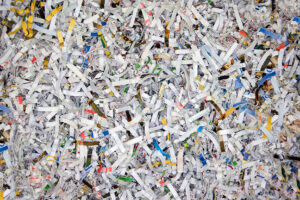When considering proper medical-waste management, nursing homes face major liability challenges. Despite often-times having a lack of resources and handling the more complex situations of caring for the elderly, nursing homes are held to the same cradle-to-grave liability law as hospitals and other medical practices and simpler situations.
Nursing home facility managers endure a variety of difficult situations on a daily basis, around the clock. Caring for elderly patients who suffer from dementia or wandering habits make it extra dangerous when housed in a facility that also utilizes syringes and other contaminated medical supplies. This is one of the key reasons why proper medical-waste management is vital to the safety of patients and survival of the facility.
Regulated Medical Waste (RMW), as classified by local, state, and federal authorities, must be separated from regular trash, contained in specific containers, treated, and finally disposed of properly with specific documentation proving that all of the steps were indeed followed.
Some of the particular challenges that nursing homes face when it comes to proper waste management are over-classification of waste, generating a higher volume of sharps waste, and variable monthly costs & estimates.
Over-Classification of Waste:
When resources are low and staff is either stretched thin or not trained properly, it’s common to see an over-classification of waste. It’s far easier throwing uncontaminated latex gloves, cloths, or bandages in the red-bag waste rather than go through the trouble of separating. When a higher volume in RMW containers waiting to be picked up from third party haulers is accumulated, costs rise. Since haulers often charge by container or by weight, one of the most effective ways to solve this issue is to set clear expectations with staff about what is expected and have an accountability system in place.
Generating a Higher Volume of Sharps Waste:
Nursing homes typically generate a high volume of sharps, leading managers to store the surplus as they wait for their monthly or bi-weekly pick-ups. Locked sharps containers are often kept outside due to a limited amount of inside space, to keep residents safe, and to make the pick-up more convenient. The danger however, is that these locked containers are often targeted and for the syringes, which are then used for drugs.
Variable Monthly Costs & Estimates for Companies with Multiple Locations:
When volumes vary from one facility to another, negotiating contract pricing with haulers can be tricky. The projected waste amounts across all locations can lead to an under-negotiated contract, which results in extremely high penalty fees if one location generates higher volumes than expected.
All three of these challenges can be resolved by getting an on-premise solution. An onsite solution allows for unlimited volumes of RMW to be treated- even if RMW is accidentally mixed with regular trash. There is also a low, fixed monthly rate for the service that takes only a few hours to complete. After RMW is sterilized, it can be deposited in the regular municipal trash bins, saving nursing home facilities time, money, and the headache. Handling the RMW onsite allows facilities to gain control of their cradle-to-grave liability as it removes the risks of dealing with a third party pick-up.










